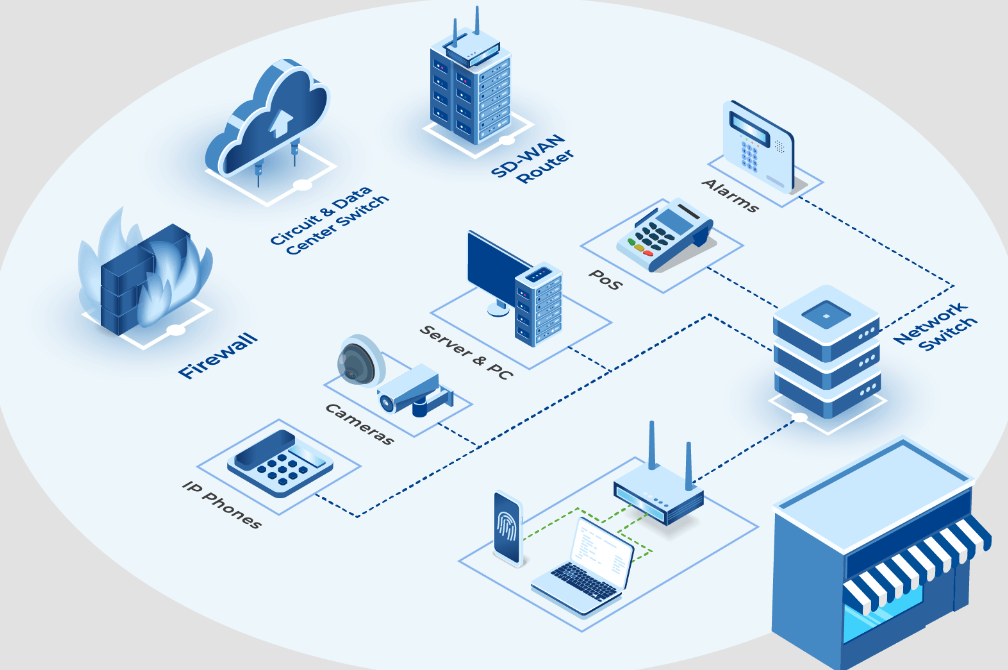
Managed Network Service Provider (Image by My Tech Mag)

Managed Network Service Provider (Image by My Tech Mag)
Let’s tackle the low-hanging fruit first, what is a managed network service provider? A Managed Network Service Provider (MNSP) is an external company contracted to manage all or part of a company’s network, including LAN, WAN & Wi-Fi components.
MNSPs deliver managed networking solutions and IT services to improve your company network infrastructure’s performance, security, and interconnectivity.
MNSPs provide various services, from data center storage, automation process, and network management to cybersecurity and compliance management.
This broad spectrum of services enables your businesses to focus on your core competencies while leaving the intricacies of IT management to the experts.
We must also recognize how critical a reliable network infrastructure is to your business.
A reliable network infrastructure supports cloud computing, facilitates remote work, and defends against cyber threats.
The transition to remote work has made MNSPs more essential than ever, ensuring employees and devices remain connected and secure.
With cyber-attacks on the rise, the role of MNSPs in anticipating and mitigating potential threats before they can cause damage is crucial.
So yes, this MNSP support ranges from ensuring seamless connectivity and network security to optimizing network performance and managing cloud services.
But which managed network service do you need?
Managed Network Service Providers (MNSPs) offer specialized services to oversee and manage a company’s network needs.
These services ensure your business’s network is efficient and secure and can scale with its growth.
Below, we delve into 8 key types of managed network services for your business operations.
Unified Messaging (UM) consolidates various forms of communication into a single, unified system.
This integration streamlines workflows and removes communication bottlenecks, significantly enhancing an organization’s operational efficiency.
UM simplifies the technology stack, lowers costs, and enhances user satisfaction.
In this way, UM leads to significant savings by consolidating multiple service providers into one, reducing the need for on-premises hardware.
Productivity boosts as employees access all communication tools in one interface, saving valuable time daily.
Network provisioning involves preparing and equipping a network to provide services to its users.
In the context of managed network services, this can include setting up network hardware, deploying software, and ensuring the network is configured correctly to meet specific business needs.
The benefits to your company include improved network performance, enhanced security measures, and the ability to scale services according to demand, contributing to operational efficiency and supporting business growth.
Network monitoring involves continuously observing a network’s performance to proactively identify and address issues.
Effective network monitoring can prevent downtime, enhance security, and optimize performance.
It lets your businesses detect potential problems before they impact operations, ensuring the network remains reliable and available for users.
Additionally, network monitoring supports compliance with security standards by identifying and mitigating potential security threats in real time.
Virtual Private Networks (VPNs) are vital when your businesses operate with remote teams or need secure connections to internal resources over public internet connections.
VPNs safeguard the privacy and integrity of data as it travels, allowing companies to securely broaden their networks’ reach.
As remote work becomes more prevalent, VPNs have proven essential for seamless business operations and secure remote access.
WAN optimization services enhance the performance of wide area networks (WANs), crucial for businesses spread across vast distances.
These services accelerate data transmission, minimize delays, and optimize bandwidth usage, making applications and data accessible swiftly and reliably, regardless of user location.
MNSPs deploy techniques like caching, traffic shaping, and protocol optimization to boost WAN efficiency significantly.
This directly impacts improving employee performance and customer satisfaction by ensuring smooth, efficient access to digital resources.
Network administration involves a comprehensive range of tasks focused on deploying, upkeep, and monitoring network resources.
Managed Network Service Providers shoulder these responsibilities, guaranteeing that the network operates smoothly, securely, and in line with the company’s strategic goals.
Their services encompass regular software updates, security patches, modifications in network configuration, and vigilant monitoring to avert any service interruptions.
By entrusting network administration to experts, businesses can reduce operational risks, cut IT expenses, and support their network infrastructure’s ability to meet current and future needs.
Cabling installation is an MNSP’s fundamental service to set up the physical infrastructure necessary for a company’s network.
This includes the planning, laying out, and connecting cables that facilitate data, voice, and video communications within and between buildings.
Proper cabling installation ensures high-speed, reliable network performance and supports future network expansion or reconfiguration needs.
MNSPs typically offer tailored cabling solutions to meet specific organizational requirements, considering factors like building layout, cable management, and compliance with industry standards.
Managed security firewalls offered by MNSPs to protect against external threats and unauthorized access.
These services include setting up, configuring, monitoring, and maintaining firewall systems.
Those services become a significant barrier between a company’s internal network and the internet.
Managed security firewalls filter incoming and outgoing traffic based on predefined security rules, thus preventing malware, attacks, and data breaches.
By outsourcing firewall management to MNSPs, businesses can benefit from expert oversight, continuous updates to security policies, and quick response to emerging threats, ensuring robust network security.

One of the primary benefits of utilizing managed network services is cost savings.
By outsourcing, your businesses can avoid the high initial costs associated with setting up and maintaining a network infrastructure.
Another key benefit is the ability of MNSPs to optimize IT infrastructure, ensuring minimal downtime and smooth operations.
They provide specialized expertise in network architecture and cybersecurity, addressing challenges swiftly and implementing best practices.
MNSPs also offer scalability and flexibility, adapting to changing business needs without unnecessary expenditure.
With 24/7/365 access to highly-trained IT professionals, businesses can count on immediate attention to IT issues, minimizing potential downtimes.
Security and infrastructure improvement is a significant advantage. MSPs fortify network defenses with continuous firmware updates and advanced safeguards, keeping data and operations secure.
So, overall, your businesses can focus on core goals. At the same time, experts manage the network, leveraging the latest technology solutions to stay ahead in the rapidly evolving tech landscape.
This strategic collaboration with MNSPs provides technological advantages, enhances brand perception, and drives business value.
MSPs enable your businesses to access sophisticated network services. They do so without the heavy lifting of managing these services in-house.
MSPs do more than just manage and maintain your IT or network infrastructure.
Through SLAs, MSPs empower you and their other clients to focus on core business. MSPs provide peace of mind, knowing their network needs are in expert hands.
They help your business remain agile, quickly adapting to new technologies and overcoming challenges.
This means even companies with limited internal IT resources can benefit from the latest IT systems.
Ultimately, MSPs provide a cost-effective way to leverage modern technology and streamline operations.
Choosing a Managed Network Service Provider (MNSP) involves considering and asking critical factors to ensure they align with your business needs and objectives.
So, start to consider the following factors when you start choosing MNSPs:
Based on these findings, we should realize how Managed Network Service Providers (MNSPs) offer essential services for modern businesses.
They host and manage enterprise network services, ranging from LAN and WAN components to virtual network functions.
Hosted in their data centers, their offerings ensure improved company network infrastructure performance, security, and interconnectivity.
MNSPs, which vary in size from niche providers to large telecommunications companies, typically bind their services with Service-Level Agreements (SLAs).
So, what is a managed network service provider more about how you can define your needs and how MNSPs provide the services that fit.